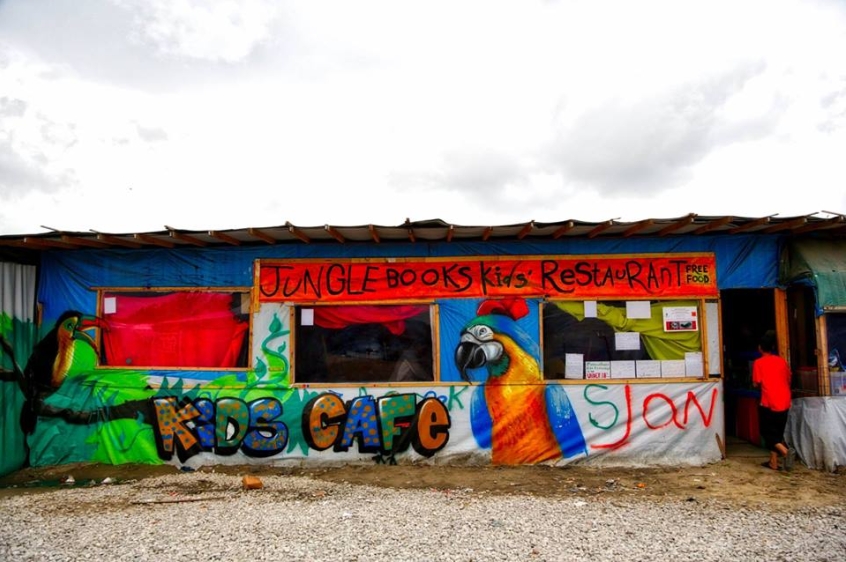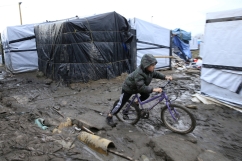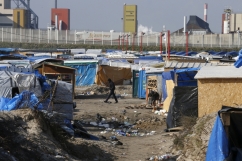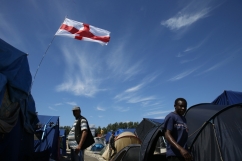
Hundreds of unaccompanied refugee children are at risk of even further suffering as French authorities threaten to demolish one of the only safe spaces for young people in the 'Jungle' camp on the outskirts of Calais.
The Calais prefecture will tomorrow decide whether to close down all restaurants and businesses operating in the camp, and among them is the Jungle Books Kids' Café.
Set up by British teacher Mary Jones, who has also established a makeshift library with the same name, the café typically offers two free hot meals a day to around 200 children in the camp who otherwise wouldn't be able to afford to eat. But it also provides a communal space where children can access vital services such as legal advice.
Campaigners are determined that the café should be saved, and have gained more than 86,000 signatures on a petition to date.
"If they decide to demolish the kids' restaurant, I think it would be criminal," Jones told Christian Today. Two weeks ago, French police raided the site and took away all the food and cooking equipment, meaning that they're now able to offer just one meal a day. Authorities justified the raid by saying the café didn't meet health and safety standards, though Jones says that with hundreds of hungry children around, food doesn't have any time to go off. And, she added, if all the restaurants are shut down, the alternative is much worse. "It's much more dangerous if 500 people are cooking on one stove in a tent," she said.
Moreover, many people, especially newcomers to the camp, sleep in the communal restaurants and shops set up by refugees in the Jungle, though French officials deny it. Demolishing them would mean forcing people out of a safe space to spend the night.
The café, in particular, is one of the only safe spaces for children. A report released in June by Unicef France and Unicef UK found that sexual violence and forced prostitution is a constant threat for children in refugee camps in Northern France, including Calais.
Some young women have exchanged sex for the promise of passage to the UK, researchers said, and children must pay an "entry fee" before they are even allowed to live in the camps. Unaccompanied minors are forced into labour if they can't afford to pay.
The Jungle Books café, therefore, is a vital space for some of the camp's most vulnerable residents. Though initially set up by Jones, day-to-day it's run by an Afghan refugee, Sikander Noristany, and hopes to provide a home away from home for children struggling to survive without family. "We started doing food because in the evening, kids had nowhere to go," Jones explained. "We wanted food to be like a magnet, and it worked really well in that by serving food the children are used to – food from home – they come, and they're there most of the day."
When people – associations or charities working to help unaccompanied children – need to talk to a child, they go to the café, and usually find who they're looking for. It also holds English and French lessons and serves as a drop-in legal centre. A psychologist regularly spends time in the café so the children get used to him, and know who they can turn to if they need help. Many of them are understandably traumatised, having made a perilous journey of hundreds, even thousands, of miles alone.
The café keeps a register of all the children it feeds – their names, and contact details of family in the UK if they have them – to help "kickstart" the process of reunification, Jones said. But when the police raided the restaurant last month, they confiscated the lists, and so far have not returned them. It's yet another setback.
There's also a youth and a woman and children's centre set up by volunteers in the camp, so the children won't be completely without a space if the café is closed. "But with 500,600 unaccompanied children, there's not just not enough space," Jones says. "There needs to be several spaces for kids to go, to do lessons. And we're the only space open in the evening."
Having lived in France for 20 years, Jones describes herself as a "migrant". Horrified by what was going on in Calais she first started working in the camp in April 2014, and more than a year on, still makes the brutal 260km round trip to Calais almost every day from her home, where she has her own children to look after. "If you saw my car, you'd believe it," she said, laughing.
She's got close to the children over the past year. "They're just lovely, and that's what's so difficult – becoming a bit of a mum figure," she said. "They're so sweet. It's heartbreaking."
Earlier this year, an amendment to the Immigration Bill tabled by the Labour peer Lord Alf Dubs meant that unaccompanied refugee minors in Europe can now legally be relocated to the UK. However, no children have so far arrived under the scheme, a failure that has been condemned both by campaigners and faith leaders. Lord Dubs, who arrived in the UK as a refugee fleeing Nazi Germany in 1939, has branded it a "national embarrassment".
"It's outrageous," Jones said. "If there was a solution for these kids, I'd stop all this tomorrow. If they could all go through on the Dubs amendment, or if the reunification process was hurried up, or the French authorities would create more space in their system and the kids were all fine, I'd stop this tomorrow.... This should be above politics."
"We're just a small voice trying to be heard," she added. "There should be an absolute outrage."
To sign the petition asking the French authorities to stop the demolition, click here.
















